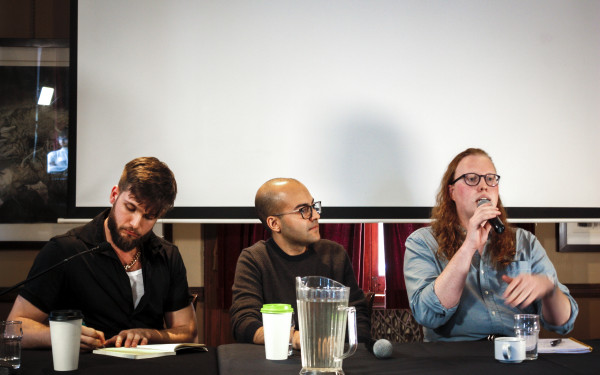NATO Council Secretary Speaks
Expect the war in Afghanistan—the longest military engagement in both Canadian and American history—to continue for a “very long” time, said Edmund Whiteside, North Atlantic Treaty Organization Council Secretary.
Speaking to a Concordia University classroom on Oct. 25, Whiteside addressed NATO’s stance on terrorism, the war in Afghanistan and the proliferation of nuclear arms.
The organization’s current focus is on the threat of transnational terrorism, made all the more pressing since the 9/11 attacks. The concretization of Iranian nuclear proliferation has also had an effect on NATO policies.
“You cannot face security in isolation and divide it up into geographic organizations, and you can’t solve problems of security alone,” said Whiteside.
He went on to discuss Al-Qaeda and NATO’s ensuing ventures in Afghanistan, stating that the country is beset by corruption, illiteracy and illicit drug trafficking. Ninety-three per cent of the world’s supply of heroin is grown in Afghanistan.
“Afghanistan will be a very long military venture,” he said.
According to Whiteside, the country, 185th poorest in the world, is looking for very simple progress but this progress will take several more years to achieve. NATO is looking to open an important dialogue with the sovereign nation.
“What it is that people want when they talk to you is to be listened to,” he said. “We talk down to them, but they just want to talk with us.”
He also admitted that aid money from NATO member states, which had previously been fuelling an insurgency during the Afghan-Soviet war, is now seen very cynically as a “proxy war” with the Soviet Union.
“We need to develop [Afghanistan], but let’s be frank,” he continued, “It’s because our security is at play.”
The second portion of Whiteside’s lecture dealt with the nuclear non-proliferation treaty.
In 1969, the International Atomic Energy Agency created a pact between China, the USSR, the US, France and the United Kingdom, giving them the right to continue the development of nuclear energy for peace, but not armament.
The non-proliferation treaty, however, is not without imperfections.
“[The treaty] is not a universal regime, and is haunted by the fact that it isn’t,” said Whiteside. “Allowing countries to not sign on leads to a no-man’s land.”
The secretary elucidated the widespread fear that countries such as Iran would opt out of the treaty and start creating nuclear weapons.
“We like to think our vulnerabilities are mitigated by the police, by insurance policies, or by our parents. There is no way to mitigate vulnerability to ballistic missile capabilities,” he said.
Twenty-five countries currently possess short- and long-range missiles, the most powerful of which can travel 3,000 kilometres in just over 830 seconds. With such frightening statistics at hand, world forces have recently been calling for the development of ballistic defence technology.
Defence technology, however, is a controversial political question that comes with ethical debates and a price tag.
“Canada says that it doesn’t need ballistic missiles,” the secretary finished. “But Canada is part of a nuclear policy alliance. There’s no getting around that, there’s no blaming the US. When we get it wrong, people remember.”



1_600_375_90_s_c1.jpg)
_600_375_90_s_c1.jpg)

